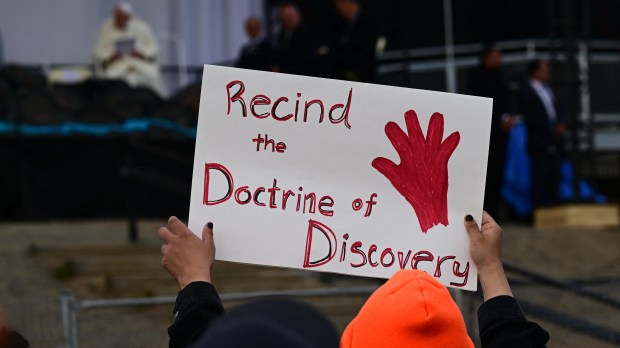With the Vatican’s formal repudiation of the so-called “doctrine of discovery,” pressure might grow for the governments of the United States and Canada to thoroughly revamp laws that impact the treatment of Indigenous peoples.
The Vatican’s Dicasteries for Culture and for Integral Human Development last week issued a joint statement renouncing the use of papal statements in the 15th century that were taken to give an “imprimatur” to Spanish and Portuguese colonizers to grab land from Native Peoples in the New World, as long as it was accompanied by evangelization.
The doctrine of discovery “found particular expression in the 19th-century jurisprudence of courts in several countries, according to which the discovery of lands by settlers granted an exclusive right to extinguish, either by purchase or conquest, the title to or possession of those lands by indigenous peoples,” said the joint statement. “Certain scholars have argued that the basis of the aforementioned ‘doctrine’ is to be found in several papal documents, such as the Bulls Dum Diversas (1452), Romanus Pontifex (1455) and Inter Caetera (1493).”
The latter was issued by Pope Alexander VI just a year after Christopher Columbus’s first voyage to the New World.
Tim Perron, S.J., in a 2022 explainer in America magazine, said Inter Caetera “mediated the dispute between Spain and Portugal over which areas of the globe were open to each for exploration and ‘discovery’ of new lands.”
The bull included the statement:
“Among other works well pleasing to the Divine Majesty and cherished of our heart, this assuredly ranks highest, that in our times especially the Catholic faith and the Christian religion be exalted and be everywhere increased and spread, that the health of souls be cared for and that barbarous nations be overthrown and brought to the faith itself…
“We, of our own accord, not at your instance nor the request of anyone else in your regard, but of our own sole largess and certain knowledge and out of the fullness of our apostolic power, by the authority of Almighty God conferred upon us in blessed Peter and of the vicarship of Jesus Christ, which we hold on earth, do by tenor of these presents, should any of said islands have been found by your envoys and captains, give, grant, and assign to you and your heirs and successors, kings of Castile and Leon, forever, together with all their dominions, cities, camps, places, and villages, and all rights, jurisdictions, and appurtenances, all islands and mainlands found and to be found, discovered and to be discovered towards the west and south, by drawing and establishing a line from the Arctic pole, namely the north, to the Antarctic pole, namely the south, no matter whether the said mainlands and islands are found and to be found in the direction of India or towards any other quarter, the said line to be distant one hundred leagues towards the west and south from any of the islands commonly known as the Azores and Cape Verde.”
Perron explained that as European colonies became countries, Indigenous peoples’ land rights became an issue.
“In the United States, the 1823 court decision Johnson v. McIntosh wrote into law justifications for colonizing land, much of which was land inhabited by natives,” the Jesuit wrote. “The chief justice, John Marshall, cited … Inter Caetera … as a justification for the court’s decision.”
In Canada, Johnson v. McIntosh was cited about 70 times in regards to property law, according to American legal scholar Robert Miller.
Not Church teaching
The dicasteries’ joint statement emphasized that the “doctrine of discovery” is not part of the teaching of the Catholic Church. Rather, it said, “the contents of these documents were manipulated for political purposes by competing colonial powers in order to justify immoral acts against indigenous peoples that were carried out, at times, without opposition from ecclesiastical authorities.
“The Catholic Church therefore repudiates those concepts that fail to recognize the inherent human rights of indigenous peoples, including what has become known as the legal and political ‘doctrine of discovery,’” it concluded.
Indeed, the dicasteries pointed out that numerous statements by the Church and her Popes since Inter Caetera have upheld the rights of indigenous peoples. For example, in the 1537 Bull Sublimis Deus, Pope Paul III wrote that Native Peoples “are by no means to be deprived of their liberty or the possession of their property.”
Implications
The joint statement, issued March 30, stunned many, including Native American activists, advocates and historians.
“I honestly never thought I’d see something like this in my lifetime,” Bryan C. Rindfleisch, assistant professor of history at Marquette University, said in an interview. Rindfleisch is working on a report for the Catholic Church in Oklahoma regarding the treatment of Native American children in so-called residential schools in the 19th and 20th centuries.
“I’m excited about the possibility of the Vatican statement really divorcing the legal from the religious or the political from the religious and it almost puts the ball in the court of nations like the United States and Canada to basically untangle or disentangle the ways in which they use the doctrine of discovery, as was coined in the United States by John Marshall, and how it’s become so embedded in Western law or US law or Canadian law, and what is the next step on the federal side or the Canadian side for basically reconciling with the doctrine of discovery because that will have huge implications for land back movements today and all sorts of things.”
Julia G. Young, professor of history at The Catholic University of America, said that rejection of the doctrine of discovery and clarifying that it’s not a part of the teaching of the Catholic Church is a “reflection of the increasing awareness of Indigenous peoples’ experience.”
She said in an interview that the 1493 document was a “hugely pivotal moment for religion in Latin America.”
Young added that there is “clearly an effort by Pope Francis to reach out to Indigenous peoples, to dialogue with them and to kind of build bridges to those communities.
“Part of that is a recognition that a lot of them are … devout and faithful Catholics, and have been as a result of 1492, as a result of the expansion of the Church in the Americas. But I think for a long time maybe they felt that there wasn’t recognition of, I guess you could say, the harm that had been done to them as a result of colonialism and the role that the Church played in that – the role the Church played in sort of justifying that colonial endeavor in the first place.”
Young hastened to add, “Throughout colonial Latin America there were people – including people in the Church – who were speaking out on behalf of Indigenous rights and against the abuse of Indigenous people – like almost from the very beginning.”
She believes that Pope Francis, who is from Latin America, is “much more aware of this history and has people working for him who are aware of this history and who have contacts in Latin America — this has been a priority. So it’s a statement that really makes sense, I think, coming from this pope.”
Legacy of a mentality
On behalf of the United States Conference of Catholic Bishops, a statement published on March 30 was signed by Archbishop Paul S. Coakley of Oklahoma City, secretary of the USCCB. Archbishop Coakley wrote that the joint statement represents another step in expressing concern and pastoral solicitude for Indigenous peoples “who have experienced tremendous suffering because of the legacy of a colonizing mentality.”
Coakley said that the US bishops will continue to support policies that will offer relief to Indigenous families who are struggling.
Both the USCCB and the Canadian Conference of Catholic Bishops said last week that they are exploring ways in which to support an academic symposium to further deepen historical understanding about the Doctrine of Discovery.
Chief Tony Alexis of the Alexis Nakota Sioux Nation in Alberta called the Vatican’s statement “a powerful recognition of the treaty rights of Indigenous peoples across Canada, especially when it comes to land,” reported The Toronto Star.
To Professor Rindfleisch’s point, Alexis said that the statement “is going to put more pressure on the courts and the government and the monarchy that’s been utilizing this Doctrine of Discovery to implement their policies and laws.”



